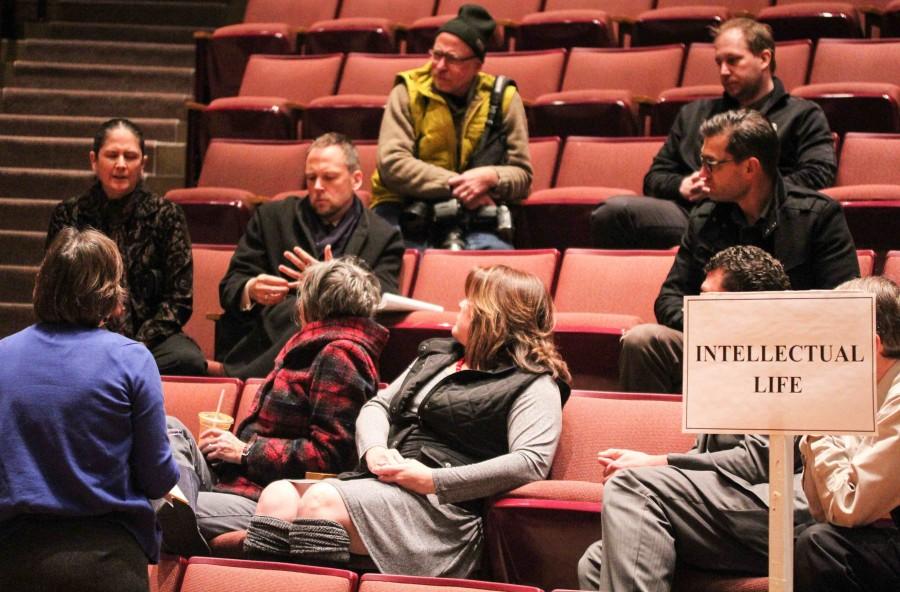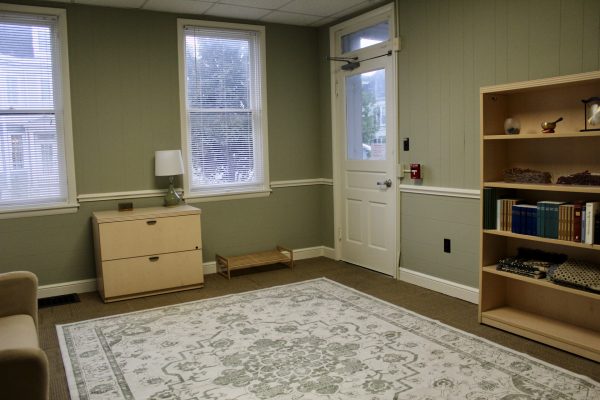SPC Discusses College’s Values at Open Meeting
Six topics that affect the daily lives of students were discussed at the Strategic Planning Meeting held in ATS on Monday, Nov. 30 at 12 p.m. The topics were narrowed down by means of a feedback process and were agreed upon by combined faculty, staff, students and alumni, according to Ashley Perzyna, assistant chief of staff to the president, who coordinated the meeting.
Perzyna explained that the Strategic Planning Committee organized this meeting in the hopes of getting “some more specific ideas about what the community thinks and how to formulate plans.”
The six topics discussed at the meeting were: Sustainability, global education, diversity, student life, intellectual life and civic engagement. Attendees could join the discussions of one or more of these topics during the 75-minute meeting. Most of the focus groups filled their respective sections of ATS, with approximately 20 people in a group at a given time.
Each group was facilitated by members of “expert teams” and led by someone who was qualified in that particular area, because “having experts facilitate adds to the process and effectiveness [of the meeting],” said Perzyna.
Director for Center for Sustainability Education Neil Leary participated in the sustainability group. He believed that it was “a great idea to be inviting the community to talk…face to face is productive.”
The diversity group discussed six pages of material, covering the college’s strengths and weaknesses on diversity initiatives, said Michael Reed, vice president for Institutional Initiatives.
“We need to work on connecting diversity between the classroom and everyday life,” said Reed. “The institution needs to be educating students on diversity in the broader community, and reaching out to that community…not just in token ways like soup kitchens. We need to move beyond diversity as differences and into equity and inclusion.”
Reed stated that the group also wants the college to have “more training for everyone, and more clarity on the purpose of the offices in Landis house, which are the Center for Service, Spirituality and Social Justice, Women’s & Gender Resource Center, the Office of LGBTQ Services, the Popel Shaw Center for Race and Ethnicity and the Prevention, Education & Advocacy Center.
Robert Renaud, vice president and chief information officer for Library and Information Services, is teaching a first-year seminar on civic engagement and brought his class to the discussion. Renaud stated that he is currently working on an analysis of external influences on the college, and that the meeting provided “lots of great feedback about how the college engages with the local and global community.”
The intellectual life group was led by Helen Takacs, associate professor of International Business and Management and co-chair of the Strategic Planning Committee. This group discussed how to make majors more involved and how to go deeper into courses and course studies.
“We talked about the primacy of intellectual life…this is why we are all here…how do we enforce that primacy?” said Takacs. “Residential colleges have this opportunity to bridge the gap between intellectual life and student life…how can students live the life of the mind inside and outside of the classroom?”
Takacs also discussed how important it is for students to really focus on a concentrated number of academic areas so as to go deeper into them, explaining that the beginning years of college are good for a wide range of focuses but as the student progresses they should limit their areas to really get into their interests.
Associate Professor of Italian James McMenamin facilitated the global education focus group. He asked the group members six questions to spark the discussion, asking broadly what the college does well in regards to global education and where its resources or capabilities are lacking.
The group also raised more specific questions, such as “What issues are most pressing regarding global education at Dickinson College? Are there, or should there be, important points of connection between sustainability, civic engagement and global education at Dickinson? What would these connections look like? Are you aware of any work in this area that our peer and aspirant institutions are doing that we need to think about?”
McMenamin felt that the discussion in the global diversity group went well, and several themes keep coming up in the group and in his discussions with other faculty, mainly “how can we at Dickinson help students return and adjust to campus and Carlisle? And how can we take advantage of their new experiences and knowledge from being abroad?”
Sarah Skaggs, director and associate professor of Dance, led the student life group.
“The first big issue that came to surface is the idea of a space that students can just hang out and don’t have to book it in advance,” Skaggs said.
According to Skaggs, some of the other issues that her group approached were the social experience of student life involved in niches and groups like sports teams and clubs, where students form strong alliances to their group rather than to Dickinson, and what Dickinson can do to create a “holistic community.” Convocation and graduation were the only two events that the group felt are holistic.
Students who attended the event saw it as a valuable opportunity to influence the strategic planning process.
“In light of what’s been happening on campus, I wanted to put myself in a place where my voice will continue to be heard and to talk to the people who have the ability to affect change,” explained Breahna Pierce ’17. “I hear people complaining about things that need to change, but they don’t come to these events. I encourage more students to come to these meetings because that’s where the work happens.”
“The main reason why I came to this meeting is because I am a part of the Dickinson community and its decisions affect me in several ways, one of which is my future. Whatever decision Dickinson takes will affect my life outside of here and my professional credibility so I wanted to be a part of defining the strategic objectives that college chooses to pursue.,” stated Marie-Noelle Nwokolo ’16. “I thought the meeting was pretty successful as a forum. People were actually listening, and it was good to have faculty and professors listen and share their experiences with these issues as well.”




